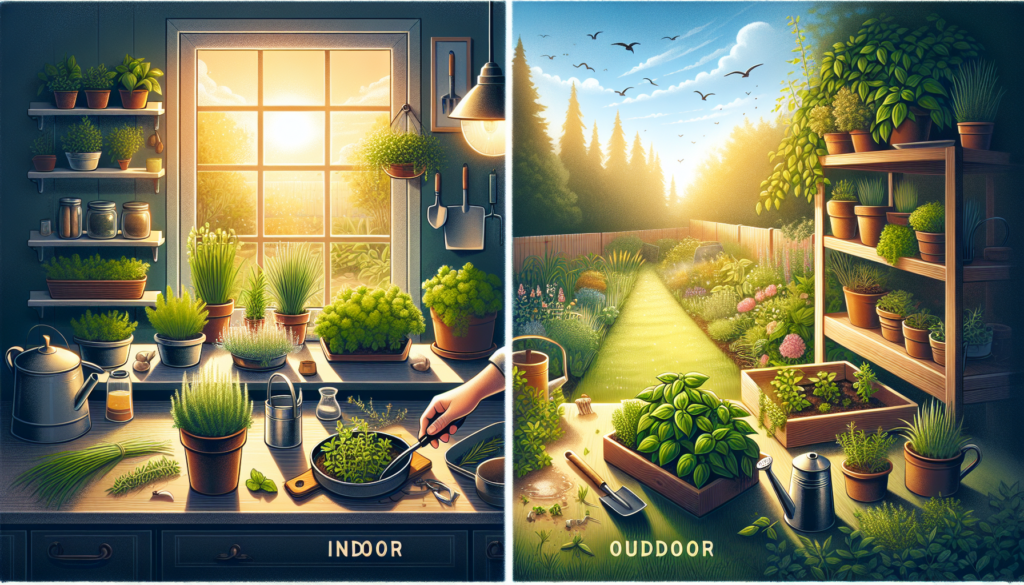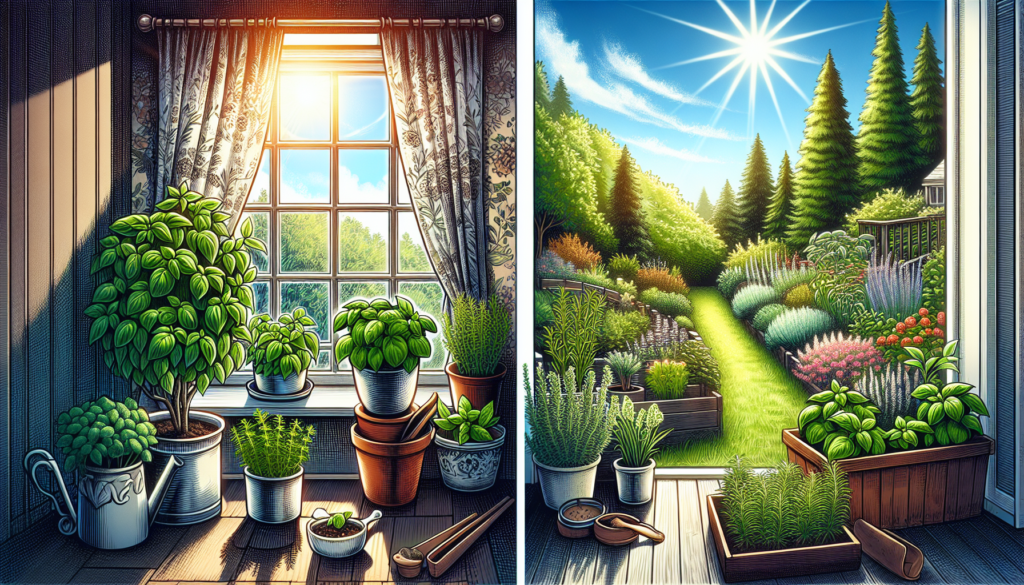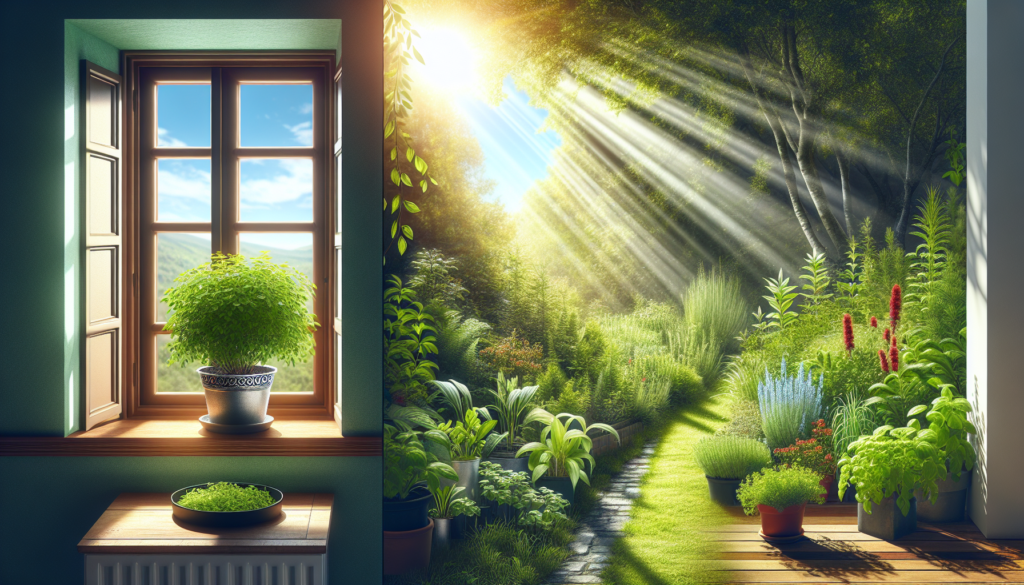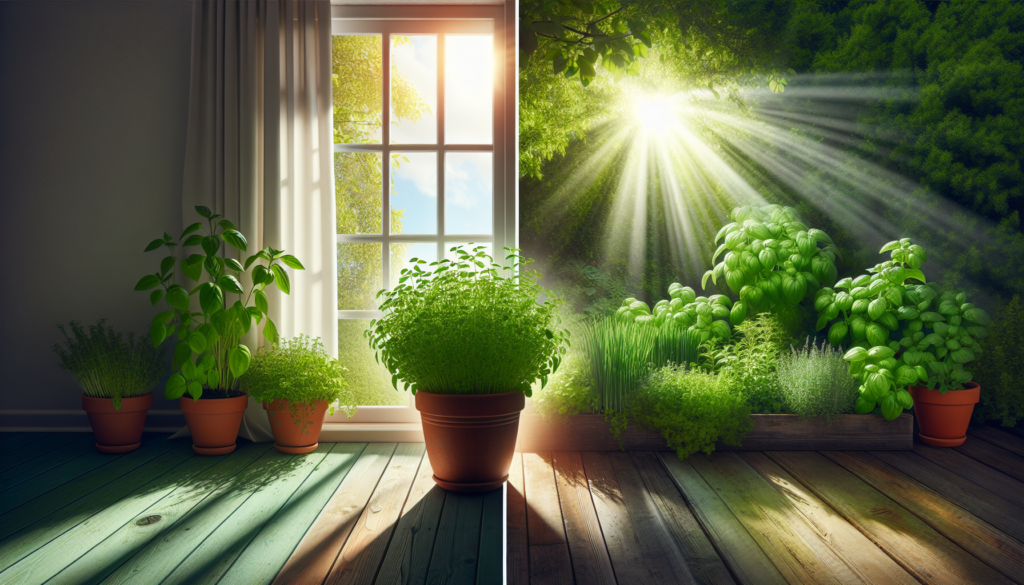So you’ve got a green thumb and want to start growing your very own herbs, but you’re not quite sure where to start. The age-old question arises: do herbs grow better inside or outside? Whether you’re a seasoned gardener or a beginner, this article will explore the advantages and disadvantages of growing herbs in both environments, helping you make an informed decision for your own herb garden. The answer to this question depends on a variety of factors and considerations. Let’s explore the different aspects of herb growing, both indoors and outdoors, to help you make an informed decision.

Light Requirements
Sunlight
Herbs, like most plants, require an adequate amount of sunlight to thrive. When growing herbs outdoors, they have direct access to natural sunlight, which provides a full spectrum of light necessary for their growth. The intensity and duration of sunlight can vary based on the season and geographical location.
Artificial Light
Indoor herb gardening allows you to have greater control over the light source. You can use artificial grow lights to mimic the spectrum and intensity of sunlight. This is especially beneficial if you live in an area with limited or unpredictable sunlight. However, it’s important to ensure that the herbs receive the right amount of light and avoid overexposure or inadequate lighting.
Temperature
Outdoor Temperature
Outdoor herb plants experience the fluctuating temperatures of their natural surroundings. While some herbs thrive in colder climates, others prefer warmer conditions. It is crucial to choose herbs that are well-suited to your region’s climate and provide them with the appropriate care during extreme weather conditions.
Indoor Temperature
Growing herbs indoors allows you to create a stable and controlled environment. You can monitor and adjust the temperature to optimize the growth of different herb varieties. However, it’s important to ensure that the indoor temperature remains within a suitable range, as excessive heat or cold can negatively impact herb growth.
Humidity
Outdoor Humidity
Outdoor herb plants are exposed to the natural humidity levels of their surroundings. Some herbs prefer drier conditions, while others thrive in more humid environments. Understanding the humidity requirements of your selected herbs and providing suitable conditions is essential for their overall health and growth.
Indoor Humidity
With indoor herb gardening, you have the ability to control the humidity levels. This is particularly advantageous if you live in an area with high or low natural humidity. Using humidifiers, dehumidifiers, or placing trays of water near your herbs can help maintain optimal humidity for their growth. Additionally, grouping herbs with similar humidity preferences together can create microclimates within your indoor garden.
Air Circulation
Outdoor Air Circulation
Outdoor herb plants benefit from natural air circulation, which helps strengthen their stems and prevents the buildup of moisture that can lead to diseases. However, air circulation can vary depending on the location and surrounding structures that may restrict airflow.
Indoor Air Circulation
Proper air circulation is equally important for indoor herb gardening. Providing a fan or creating ventilation within your indoor garden helps simulate natural air movement. This prevents the growth of mold and ensures that the herbs receive a fresh supply of carbon dioxide, which is essential for photosynthesis.

Pests and Diseases
Outdoor Pests and Diseases
Outdoor herb plants are prone to pest infestations and diseases. Common pests include aphids, snails, slugs, and caterpillars, while diseases like powdery mildew and root rot can threaten herb growth. Regular inspection, implementing preventive measures, and using organic pest control methods can help minimize the impact of pests and diseases on outdoor herbs.
Indoor Pests and Diseases
Indoor herb gardening provides better control over pests and diseases. Since the plants are isolated from the outdoor environment, the risk of pest infestations and diseases is significantly reduced. However, it’s essential to maintain good hygiene practices, regularly inspect the plants, and address any signs of pests or diseases promptly.
Space Availability
Outdoor Space Availability
Growing herbs outdoors requires space in your garden or yard. If you have ample space, you can easily set up herb beds or containers to accommodate a variety of herbs. However, if you have limited outdoor space, you may need to prioritize which herbs to grow or explore vertical gardening techniques to maximize space utilization.
Indoor Space Availability
Indoor herb gardens offer flexibility in terms of space requirements. You can grow herbs in small pots, hanging baskets, or even utilize vertical space with wall-mounted planters. This makes indoor herb gardening suitable for those with limited space, such as apartment dwellers or individuals without access to outdoor areas.

Grower’s Control
Outdoor Limitations
When growing herbs outdoors, you have limited control over external factors like weather conditions, pests, and soil quality. While you can take preventive measures and choose well-adapted herb varieties, you still depend on nature for certain aspects of herb growth.
Indoor Control
Indoor herb gardening puts you in complete control of the growing environment. You can choose the soil composition, provide optimal conditions for light, temperature, humidity, and air circulation. These factors can be adjusted and tailored to the specific needs of each herb, promoting their growth and overall health.
Watering and Drainage
Outdoor Watering and Drainage
Watering outdoor herb plants can be more challenging to control compared to indoor gardening. Rainfall and evaporation rates can vary, making it important to monitor soil moisture levels. Proper drainage is crucial to prevent waterlogging and potential root rot, especially during heavy rainfall.
Indoor Watering and Drainage
Indoor herb gardening allows you to regulate watering more precisely. You can adjust the frequency and amount of water based on the specific needs of each herb. Additionally, indoor pots often come with drainage holes, ensuring excess water can easily escape. However, it’s essential to be attentive and avoid overwatering your herbs, as this can lead to root damage.

Seasonal Variations
Outdoor Seasonal Variations
Outdoor herb plants experience the natural cycle of seasons, which can affect their growth patterns. Some herbs may enter dormancy or require winter protection during colder months. Adjusting your herb care routine and providing necessary shelter or insulation can help outdoor herbs thrive in different seasons.
Indoor Consistency
Indoor herb gardening provides a more constant and consistent environment throughout the year. By maintaining stable temperature, light, and humidity levels, herbs can grow continuously without the interruption of seasonal changes. This consistency allows for year-round herb production and ensures a steady supply of fresh herbs.
Cost Considerations
Outdoor Costs
Growing herbs outdoors generally incurs lower costs as natural resources like sunlight and rainfall fulfill most of the plants’ requirements. However, expenses can arise from purchasing high-quality soil, fertilizers, pest control products, and protective measures against extreme weather conditions or pests.
Indoor Costs
Indoor herb gardening often involves more initial investment due to the need for artificial lighting systems, grow tents, or grow lights. Electricity costs associated with maintaining optimal indoor conditions should also be considered. However, the controlled environment and year-round production can offset these expenses by providing a constant supply of herbs.
In conclusion, whether herbs grow better inside or outside depends on your specific circumstances and preferences. Outdoor gardening offers natural resources, space utilization, and lower costs, but comes with limitations and the need to adapt to seasonal variations. On the other hand, indoor gardening provides better control, consistency, and protection from external factors, but requires initial investments and ongoing monitoring. Consider your available space, climate, resources, and the level of control you desire before making a decision. Remember, regardless of where you choose to grow your herbs, with proper care and attention, you can enjoy a bountiful and thriving herb garden.





